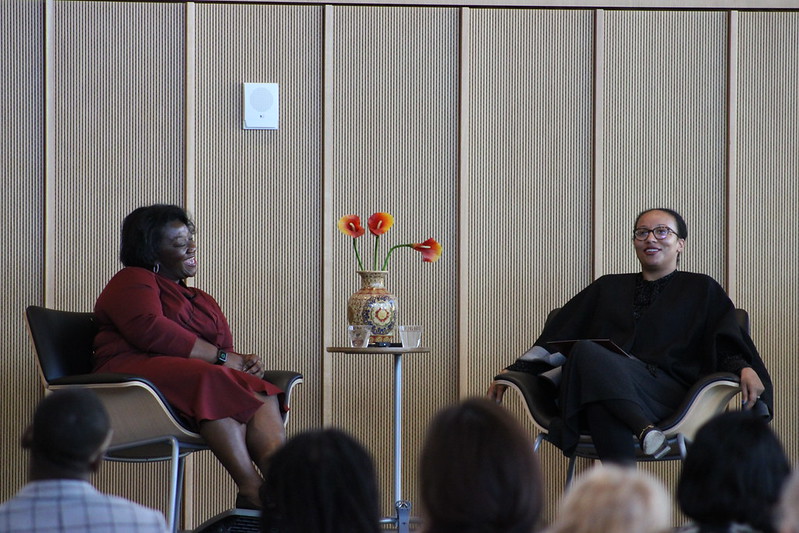On Wednesday night, New York Times columnist Tressie McMillan Cottom and associate professor of education policy at Southern Methodist University, Dominique Baker, held a conversational forum in the Student Union Ballroom.
Both women tackled numerous topics ranging from the state of racism in the United States to equal access to higher education. Baker and Cottom also noted the effects of hustle culture on younger generations and how that influences the future career endeavors of students. The inequities enabled by hustle culture is a concept much explored in Cottom’s work.
The event began by exploring the topic of diverse representation in a digital and informational economy.
“The thing about this information economy is that it makes the efficient sorting of people, not about how you can exclude them, but how efficiently you can include them while on predatory terms,” Cottom said.
She proceeded to further explain our modernized system of racism, one in which marginalized groups are no longer outrightly excluded, but instead include them on specific terms when they are beneficial.
When asked about solutions to modern racism on a university level Cottom said, “to facilitate and to put in place the processes for democratic shared governance, I think it’s the best that we can do.” To pursue a shared governance, universities need to be, “transparent on how decision making happens, the challenges facing the university and transparent about how the financing and structure of the university works” Cottom said.
She noted how there is much more for students to invest in at a university, beyond just declaring a major and seeking job security. Students also need to invest in the community.
“We need to create an experience where people feel like they bought into a community, not just for potential post-grad investors, but so they will believe in the idea of what public universities can do for people,” Cottom said.
Barker explained the cause and effect of hustle culture among young students while Cottom gave examples of her students having created LinkedIn accounts, beginning in middle school. According to Cottom, this phenomenon stems from young people feeding off the anxiety of the adults in their personal lives.
“There are people around them who are encouraging them to start their professionalization, digital footprint, how to use the internet responsibly, how to network. They’re being coached,” Cottom said.
She noted that the hustle culture community remains gentrified and thus isolated. You can have 150 contacts on LinkedIn, Cottom said, but if you’re poor then those contacts are also most likely going to be poor. A wealthier student will also have 150 contacts, but their contacts could all be ivy-league educated peers. She noted that classism plays a major role in hustle culture and job opportunities.
“Tressie Cottom had such good messages about being mindful of the institution we’re in and ways that we should question it. That we should value the work we’re doing and focus on the room for change,” Director of Library Communications, Carol Connare, said. She plans on transferring Cottom’s ideologies into her classroom.
Madeline Zelazo, a recent graduate of the University of Massachusetts, found immense inspiration during Cottom and Baker’s conversation. “What she said about always showing up as your full self was just so real and true, especially in a classroom dynamic,” she said. “It opens up so much space for students to explore their identities which is what education is supposed to be about.”
“This is a time where we have more information than we know what to do with,” Cottom said. “This is a time where people can ask better questions. So, if people leave tonight with one good question, that they can’t stop thinking about, that they want to talk to other people about. Then I’m really pleased.”
Tyler Charpentier can be reached at [email protected].



















